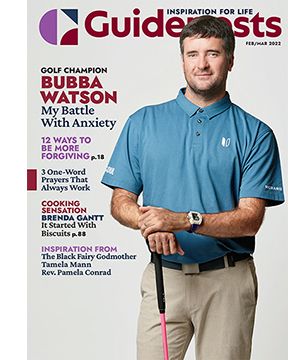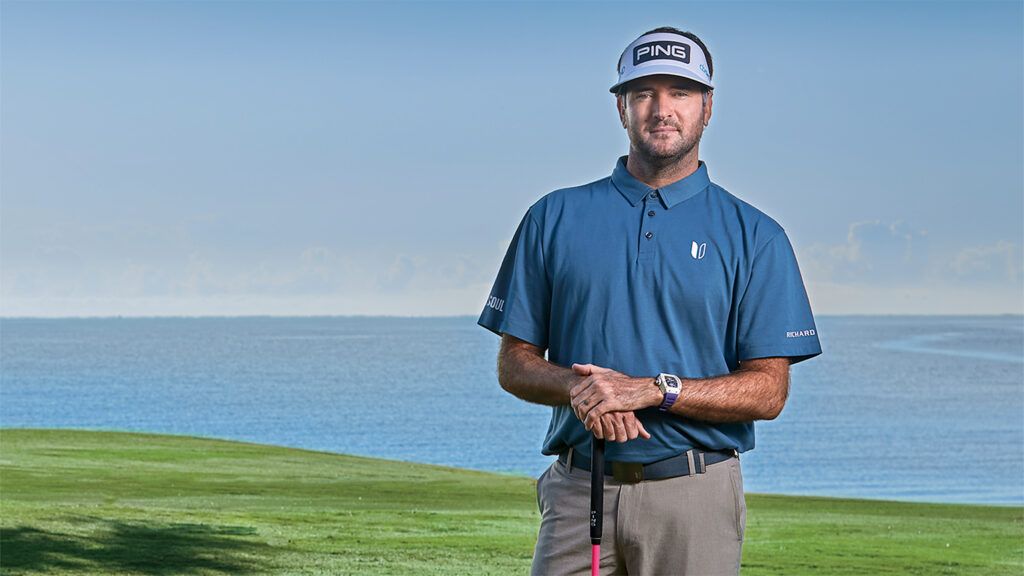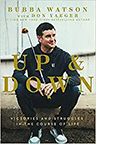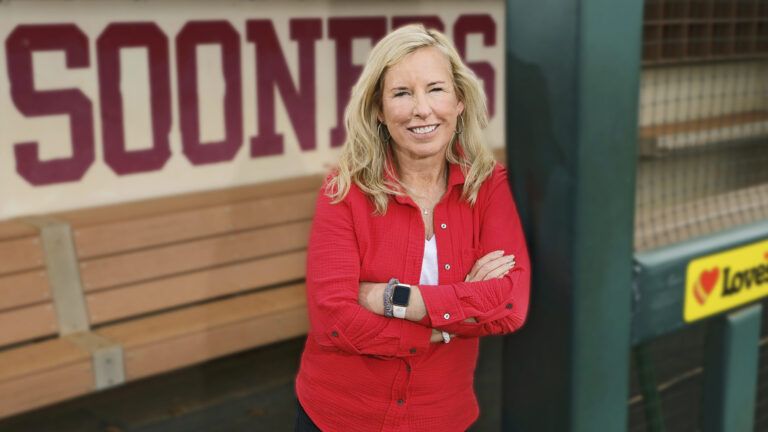I still have the Titleist Balata ball, sitting in a glass case on a shelf in my house. It’s not from the Masters or The Travelers Championship or any other professional golf tournament I’ve won. No, it’s from a win back when I was 13 years old, at the 1992 Divot Derby, the biggest junior golf tournament in the Pensacola area, where I grew up.
That win sparked my determination to become a pro golfer, to become, as my dad said, a leader, not a follower. It also sparked something else—a sense of…I didn’t know what. A foreboding that things might not ever get any better than my last win, that I’d never really be good enough. It was a feeling that would, as the years passed and my career flourished, consume my life.

2022 issue of Guideposts
My first love was baseball. My dad thought I was destined to pitch for the New York Yankees. Then, when I was six, lightning struck: I got a left-handed nine-iron golf club, cut down to my size. I became obsessed with golf, spending countless hours hitting plastic balls around—and over—our house.
Our family didn’t have much money. My dad was a construction engineer at a chemical plant. But Mom and Dad could see my talent, and, at age eight, for Christmas, I got a brand-new PING junior set from them.
Winning my age division at the Divot Derby became standard fare. But that day, when I was 13, playing with that Titleist ball, I finished at 10-under par 62. In case you’re not a golf fan, 10-under is great at any level of the game, let alone a junior championship. Maybe I could live up to my dad’s expectations…and mine.
My world shrank to the size of that Titleist. My father came to all my tournaments, leaning against a tree, puffing on a cigarette, sipping beer out of a Styrofoam cup, seemingly judging my every shot. He rarely mixed with the other parents, who were generally more upscale than we were.
My dad was a good man—a good husband and a good father to my sister and me. He was as tough on himself as he was on us. A Vietnam veteran, he had been wounded in combat and entitled to be awarded a Purple Heart, but he refused to accept it because he saw his wounds as a sort of failure, as if he didn’t do his job. I knew that deep down he was proud of me, and loved me, and that he supported my dreams of going pro.
I enrolled at the University of Georgia. That’s where I met my wife, Angie—the best thing that ever happened to me on or off a golf course. Till then I’d never really been in love with anything other than a golf club. Angie taught me what it was like to love another human being with all your heart. She also taught me what it meant to love the Lord.
We were not a big churchgoing family back in Pensacola. Faith was the shining center of Angie’s life. How could I love Angie fully if I didn’t share her love of God and his commandments? She and I dedicated ourselves to a Christ-centered relationship.
Only a loving God could have taken my head out of golf and led me to such a kind, generous woman with a vibrant faith that filled her spirit—and mine. At our wedding, I was so overcome with emotion, tears rolling down my cheeks, I could barely say, “I do.” (I admit it, I’m a crier.)
Not that my golf took a back seat. Having helped the Georgia Bulldogs win the SEC championship in 2000, I turned pro in 2001, not long after meeting Angie. I pushed myself relentlessly to get my PGA tour card so I could qualify for the big-money tournaments.
Professional golf was a level of competition I could not have imagined even in college. It was a struggle to make cuts and play in the final rounds. But I moved up the ranks, always striving to be at the top of the game, always feeling as if my father were leaning against a tree, judging my shots.
I got a reputation—deservedly—for being overly aggressive and cocky. Looking back, I realize that my behavior was meant to cover up my fear of losing, of never being better than the last win. Back then, it seemed like what I had to do to survive on the tour. Never show weakness.
Then came a devastating call from my father when I was out on the road.
“I have throat cancer,” he said in his typically blunt way.
“How bad is it?” I said.
“Bad.” The doctors gave my dad months to live. I just couldn’t accept that. My longtime caddy, Teddy, whose faith is as deep as Angie’s, urged me to send him a letter. A letter? Dad and I had never had any of those serious father-son talks, let alone letters. “I’ll write everything down,” Teddy said. “Just tell me what you want to say.”
Everything came out. How much I loved him, how I wanted so bad to make him proud, to feel good about my success, how I wanted him to be happy when he went to the Lord, how it was never too late to give yourself to God.
He never made any reference to that letter—except once. We were on the phone, and he declared that when he got to heaven, he was going to become a great golfer so he could beat me.
I laughed and told him, “Heaven ain’t that good a place!” My dad, always the competitor. Cancer was one thing he couldn’t beat.
One of the last conversations we had was after I’d just gotten my first big win on the tour, the 2010 Travelers Championship. Dad called. “What are you doing?” he asked.
“Just sitting here,” I said. “Soaking it in, at least trying to.”
“Why aren’t you out practicing?” he asked. “Everybody else is. They’re trying to beat you now.” Why wasn’t I practicing? Why wasn’t I worrying about the next cut I had to make?
You don’t keep those feelings inside. You overcompensate for your lack of confidence. As I said, I could be aggressive, even mean-spirited, despite my profession of Christianity. A jerk. Not long before winning that first tournament, Teddy called me on it. “You know,” Teddy said, quoting as he could straight from the Bible, “it’s our job to ‘encourage one another and build each other up.’” My caddy was calling me out?
“You’re not being who you should want to be,” he said. “You’re not even trying. You’re hiding.”
All my life, I’d been running away from this worry that I wasn’t good enough, and I’d sometimes taken it out on other people. Hadn’t I pledged to live a Christ-centric life when I met Angie? That meant on the golf course too. Teddy was right. Maybe because golf came into my life first, before I met Jesus, I’d never quite figured that out. After I met Angie, nothing in my life could come before God. My life was on one path, not two, even if I still needed to be reminded from time to time.
I won my first major, the Masters in 2012—finishing with a minus 10, by the way—and I still couldn’t relax. I thought of all the great names in our sport who’d won that event, and I didn’t see where I fit in. Maybe I was just an impostor, a flash in the pan. I ended up taking the storied green jacket awarded in Augusta, Georgia, and shoving it in the back of my closet. I could see the concern in Angie’s eyes as she watched.
My nerves were shot. I couldn’t get on an airplane without taking a pill. One night, I felt this suffocating weight on my chest.
“Angie, I think I’m having a heart attack.”
The hospital admitted me and did all sorts of tests. “There’s nothing wrong with you,” the doctors said. “You’re in great shape.” I won a second Masters. I moved up the ladder, my winnings putting me close to the top. Is this as good as it’s going to get?
I had another one of those “heart attacks” and rushed off to the ER. Someone said something about it being a panic attack, but I wasn’t listening. By 2017, I was losing weight. Losing the muscle mass I needed to hit winning shots.
One morning, I got on our bathroom scale. It said 162. I’m six foot three, bigger even than my dad. I’d never been so thin in my life, almost 30 pounds below my normal weight. In the mirror, I looked emaciated. What was happening to me?
I felt panicky, as if having another “heart attack.” I collapsed to my knees. “God, I’m so lost! Something is wrong with me, and I don’t know what it is. Help me, please help me.”
I was losing. But not on the golf course, nowhere but inside my head. I’d lost the battle of denial. In the depths of my suffering, when I cried out to the Lord, I also began to feel a release, as if at last I’d truly handed my burden of self-doubt and worry to God, a burden I’d always thought was mine alone to bear.
Anxiety had come to rule my life, not a loving God; the insidious anxiety that went all the way back to that tournament I won at 13 and the winning ball I still had. I thought about that ball, sitting in its case on my shelf, and instead of the foreboding that had crept over me the day I shot 62 with it, what I felt now was something completely different. I felt so blessed.
I thought back to my parents. Their quiet affection for each other, the way they’d never leave the house or return without a kiss. Were they perfect? Of course not. Neither was I. But that underlying love was there, the way it was in my own marriage and life with Angie and our kids. And without a doubt, I knew God loved me—love that could be equaled by no other force in the universe.
If only I could let that all-encompassing love banish my fears, my lifelong battle with anxiety.
One of the last times I’d seen my dad, I’d flown back to Florida. He and I sat on the porch and had a friendly enough chat, talking about golf mostly. I got in the car to drive to the airport but stopped.
I parked the car and walked back up to the porch. I said what I had never said out loud to him. “I love you.” Tears flooded my eyes. (Remember, I’m a crier.) Amazingly, tears came to his eyes as well. “I love you too,” he said.
That was the legacy I needed to hold on to. Not one of continual self-criticism, of constant dread of missing the mark. “Love your neighbor as yourself,” Jesus said. It was that last part that was missing in me. I needed to start giving myself a break. I was so worried about what others believed about me that I wasn’t acting like the person I wanted to be.
Angie, Teddy and the people who really knew me all believed in me, not just as a golfer but as a person. I just had to figure out how to be my true self. I am not completely free of anxiety. But turning to God, turning to others, making sure that golf ball is not my whole life, is where I started. I surrendered to the fact that I had a problem, an anxiety disorder, and took my first crucial step toward finding help and getting better.
Believe it or not, I’ve even taken up fishing. Something I used to think was boring. Doesn’t matter if I catch anything. It’s an escape from the tour and the things that can trigger anxiety. I recharge my batteries, as they say, especially my spiritual batteries. I relax. And I thank the Lord for the blessings I’m learning to embrace.
* * *
Bubba Watson’s Tips for Battling Worry and Anxiety
Have someone to talk to. Anxiety can be a tiger, but talking can shrink it to a pussycat. Angie, Teddy, my Bible study group, my pastor—all have helped me deal with worries and see problems as manageable.
Rest. Resting doesn’t necessarily mean lying around the house. Go for a walk, head to the beach or a museum, catch a movie. Get together with your friends and family. Nothing eases my stress more than being around the people I love, especially our two kids.
Have a hobby. Golf isn’t a hobby for me. It’s my profession. That’s all the more reason I look for and need other things to do. So do you.
Pray and meditate. Many athletes visualize success. They imagine the putt going into the hole, the football sailing through the goalposts, the baseball nipping the corner of the plate. I meditate on the mental image of a loving God holding me in his arms. I visualize myself giving all worries and fears to him. Then sometimes I catch a fish.
Bubba Watson is the author of Up & Down: Victories and Struggles in the Course of Life.
For more inspiring stories, subscribe to Guideposts magazine.







